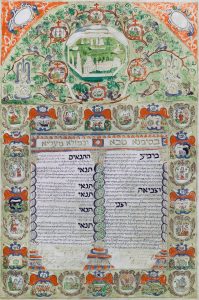Stories & Legends
By Reb Daniel Lev
Reb Zalman’s Two Menorahs: A Hanukkah Tale
November 30, 2021
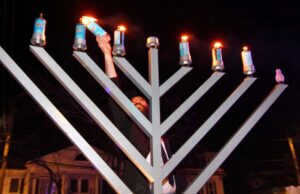 The great Rebbe of San Francisco, Reb Zalman, had a curious practice that he engaged in on the eighth night of Hanukkah: As on all the other nights he would gather some of his Chassidim—students and friends—in the home he shared with his wife, and they’d light the holiday candles on the living room windowsill. Then, after a few songs and bit of a teaching, he would walk the fifteen steps up the circular steps to his attic where he would light a very large olive-oil, Hanukkah menorah-lamp that spanned six-feet in length. Once there, he would not come down for most of the night and into the morning, to the consternation of his loving wife! By his body language and face, he had made it very clear that no one was to disturb him while he sat by the large Hanukkiah.
The great Rebbe of San Francisco, Reb Zalman, had a curious practice that he engaged in on the eighth night of Hanukkah: As on all the other nights he would gather some of his Chassidim—students and friends—in the home he shared with his wife, and they’d light the holiday candles on the living room windowsill. Then, after a few songs and bit of a teaching, he would walk the fifteen steps up the circular steps to his attic where he would light a very large olive-oil, Hanukkah menorah-lamp that spanned six-feet in length. Once there, he would not come down for most of the night and into the morning, to the consternation of his loving wife! By his body language and face, he had made it very clear that no one was to disturb him while he sat by the large Hanukkiah.
Reb Samuel, Reb Zalman’s top student, and some of the other Chassidim would stand by the living room menorah after the Rebbe left and speculate as to the differences between the “lower” and “upper” Hanukkiot. Reb Steven the photographer said, “This menorah represents the corporeal world of superficial materialism while the Rebbe’s menorah represents Heaven and all its holy manifestations.” Reb Candice the accountant, shouted “No, no! This menorah stands for the cold intellect that measures all things while the one above has the warmth of spiritual passion, loving all of creation!” Reb Myron the carpenter insisted, “I believe that this menorah reflects our existential state of being; that we all dwell within this worldly plane and attempt to search out the deepest meanings in life. But the Hanukkiah upstairs teaches us to transcend all of that and be aware of the presence of HaShem who knows and sees all.”
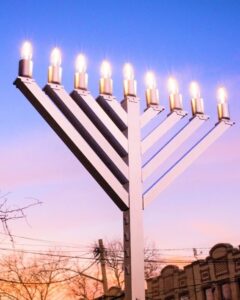 Reb Cindy the software engineer said, “You may be correct, but would it not be simpler to just consider that this menorah represents our community here where we strive to become good Jews and the upper menorah is the place for holy people on the level of our Rebbe, Reb Zalman?” Reb Rachel interrupted, “I don’t think so, I think…” On and on they went with their speculations. But this year … Reb Samuel felt a deep yearning to actually know what the Rebbe was doing up there. As the Chassidim debated, Samuel slowly and quietly crept up the steps to the Rebbe’s attic. In the doorway he saw Reb Zalman sitting in the middle of a long bench that faced the fiery Hanukkiah lamp. He was so raptly immersed in watching the flames that he did not seem to notice Shmuel tiptoeing his way to the far end of the bench where he sat down very quietly.
Reb Cindy the software engineer said, “You may be correct, but would it not be simpler to just consider that this menorah represents our community here where we strive to become good Jews and the upper menorah is the place for holy people on the level of our Rebbe, Reb Zalman?” Reb Rachel interrupted, “I don’t think so, I think…” On and on they went with their speculations. But this year … Reb Samuel felt a deep yearning to actually know what the Rebbe was doing up there. As the Chassidim debated, Samuel slowly and quietly crept up the steps to the Rebbe’s attic. In the doorway he saw Reb Zalman sitting in the middle of a long bench that faced the fiery Hanukkiah lamp. He was so raptly immersed in watching the flames that he did not seem to notice Shmuel tiptoeing his way to the far end of the bench where he sat down very quietly.
Samuel wondered, “what did the Rebbe see in the Chanuka flames.” Samuel began to look into the large flames emanating from each of the nine bowls that topped each menorah column. After a while, thoughts of his beloved father, who died only recently, began to enter his mind. Suddenly tears came to his eyes as he felt a longing to see his dad. Then out of nowhere he saw it…. he didn’t believe it at first but there it was….in the first Hanukkah candlelight, his father’s face began to take shape in the light, smiling down on Samuel. This brought tears of joy to his eyes and as he beheld that face, he also felt all the wisdom, all the intimate experiences his father shared with him flooding through his heart.
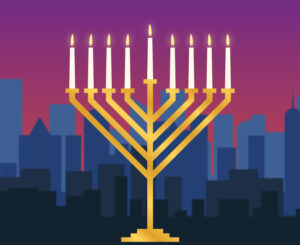 Samuel gazed deeper into the flames until thoughts of his mother came. She died many years ago just before his bar mitzvah. And at that same moment her face appeared in the second Hanukkah light. Again, he became filled with memories of the life lessons she passed on to him as well as wonderful times he spent with her as a child. One after another, each of the eight ritual lights of Hanukkah filled with the faces of departed loved ones, teachers, and friends. Each one shining their insights and experiences into Samuel’s waiting heart. Although he wept as quietly as he could, when the face of his favorite Rebbe of Old, Reb Nachman of Bratzlav, shone in the glow of the shamash light, Shmuel could no longer contain himself and he cried aloud. This brought Reb Zalman out of his contemplation and when he turned and saw Reb Samuel crying over the visions of his loved ones the Rebbe slid down the bench and placed his arm around him. After a short while, Shmuel had calmed. “Rebbe,” he asked, “how was I able to see these faces and absorb the years of experiences and learning from them?” Reb Zalman said in a low, soothing voice: “You see, the menorah downstairs is an ordinary one. When we light it, it is part of our ordinary life, and we celebrate the holiday from that place. This Hanukkiah, however, is beyond our ordinary world. It is the place of the Infinite, where souls who are no longer in the ordinary world dwell. On the eighth night of Hanukkah, when you gaze at these lights and open your heart and mind to them, the souls of your life, who guided you along the way, will reveal themselves to you. When that happens, they will once again shine their love and insights into your very being.” The Rebbe and Samuel walked downstairs and shared their experiences with the Chassidim.
Samuel gazed deeper into the flames until thoughts of his mother came. She died many years ago just before his bar mitzvah. And at that same moment her face appeared in the second Hanukkah light. Again, he became filled with memories of the life lessons she passed on to him as well as wonderful times he spent with her as a child. One after another, each of the eight ritual lights of Hanukkah filled with the faces of departed loved ones, teachers, and friends. Each one shining their insights and experiences into Samuel’s waiting heart. Although he wept as quietly as he could, when the face of his favorite Rebbe of Old, Reb Nachman of Bratzlav, shone in the glow of the shamash light, Shmuel could no longer contain himself and he cried aloud. This brought Reb Zalman out of his contemplation and when he turned and saw Reb Samuel crying over the visions of his loved ones the Rebbe slid down the bench and placed his arm around him. After a short while, Shmuel had calmed. “Rebbe,” he asked, “how was I able to see these faces and absorb the years of experiences and learning from them?” Reb Zalman said in a low, soothing voice: “You see, the menorah downstairs is an ordinary one. When we light it, it is part of our ordinary life, and we celebrate the holiday from that place. This Hanukkiah, however, is beyond our ordinary world. It is the place of the Infinite, where souls who are no longer in the ordinary world dwell. On the eighth night of Hanukkah, when you gaze at these lights and open your heart and mind to them, the souls of your life, who guided you along the way, will reveal themselves to you. When that happens, they will once again shine their love and insights into your very being.” The Rebbe and Samuel walked downstairs and shared their experiences with the Chassidim.
And in the next year, at Hanukkah time, the Rebbe invited all of them to join him, to take in the presence of this Infinite light beyond the ordinary…
Moshe the Thief Goes to Heaven
June 2, 2021
Chaim was a humble blacksmith who lived in the town of Shploitz in lower Silesia. Next door to him lived Moshe the Thief. Although he never got caught, Moshe was known as an expert burglar. Chaim, too, was burglarized by Moshe but he never held it against him; he knew that Moshe was just trying to make a living like everyone else. One night, Moshe was on a job at the house of Mordechai the butcher. As he tiptoed toward the window, weighed down by many objects of silver and gold, he heard a bang! The butcher had been waiting nightly, gun in hand, determined to shoot him. But it was dark, and Mordechai was a lousy shot. The pile of silver dishes caught the bullet, knocking Moshe out the window, and Moshe quickly ran to safety. At home, Moshe decided he was getting too old to burgle. Now, before the wonders of Social Security, the only source of support a retired person could get was a little pension from the town’s Va’ad – their version of Jewish Community Services. Moshe’s house was paid off and his expenses were taken care of – all he needed was money for food. So he went to see about the pension.
“Hello brothers,” Moshe joyfully exclaimed to the officials, “I now realize that I am too old to work as an….uhm…water carrier! When can I begin to receive the community pension?”
“Well,” laughed the Va’ad official, “We would be delighted to provide you a lifetime pension…” He paused a long while. “Once you return what you’ve stolen from the community!” Moshe was a little flustered and replied, “But good sir, even if I had been a burglar all these years, I could not pay that back because it would already have been spent.” Moshe could not convince the official, so he sadly returned home. Once the townspeople heard about this, many of them joyfully held vigil outside his house, waiting for him to die from starvation. Chaim, his neighbor, felt sorry for him. So, once a week he placed a boxful of groceries on the back porch of Moshe’s house, knocked loudly and ran back to his house. Moshe apparently never knew who his benefactor was. Time passed and, eventually, so did Moshe – dying peacefully in his sleep. Not long after that, Chaim, too, died of old age. Chaim’s soul rose higher and higher until it came before the Gates of Pardes (Paradise). It is known that standing near the Gate is a magnificent scale with two wide pans. Two angels come out – one angel carries your Ma’asim Tovim, your good deeds and places them on one side of the scale; the other angel places your Aveirot, your sins, on the other. If the good outweighs the bad, you go right into Paradise. Chaim watched as the angel Michael called out, “bring the Ma’asim Tovim.” Chaim thought that he had done good in the world and looked forward to many of these. A skinny angel brought out a briefcase and easily tossed it onto the scale – which sunk down about six inches. “Oy,” thought Chaim’s soul, “that looks pretty bad.” His spiritual heart sank very low at that moment. “Bring out this soul’s Avairot,” yelled Michael. A burley angel came in pulling what looked like a heavy wagon with a huge trunk apparently brimming with heavy sins. He got to the edge of the other scale pan, lifted the trunk and threw it in the air. It landed on the pan and… nothing happened. The Beit Din proclaimed that Chaim could go right to Paradise! But wait!……What happened to all the sins in the trunk?
Moshe stole them.
The Nistar Study and Practice Circle
Jun 12, 2020
By Reb Daniel Lev
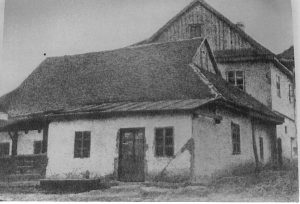
Reb Wolfe Kitzes was having a panic attack under his tallit as he waited for his Rebbe, the founder of the 18th-Century mystical revival movement in Poland, the BESHT (Baal Shem Tov), to begin to blow Shofar on Rosh Hashanah. Wolfe was earlier tasked by the BESHT to call out the names of each Shofar call and make sure that he had each different Kavvanah (mystical intention formula) in his mind for each calling. He was so nervous the night before that he wrote all 100 calls/formulas on his shirt sleeve so he could read them. Unfortunately, his wife accidentally switched shirts on him and all he had was a pure white sleeve to gaze at. So he was panicking!
Suddenly, he heard the BESHT loudly whisper, “NU?!” and Wolfe could wait no longer. He knew the Shofar calls and began shouting out “Tekiya! Shevarim! Teruah!” But his head was empty of all the supernal Kavvanot handed down by followers of the great Mekubal, the great Kabbalist, Rabbi Yitzchak Luria. Wolfe’s anxiety now turned to tears as he cried out the empty calls, sad that Heaven would not receive the Shofar blasts…nor would the hearts of the congregants open fully to the Oneness and awesome splendor of the Holy Presence of Hashem.
His heart was broken by the end of the blowing. Then, after he pulled his tallis down he saw that everyone was in a joyfully trance-like state, and, looking onto the BESHT’s eyes Wolfe saw that their prayer had ascended and that the souls of all present were open to the Healing and Holiness of Rosh Hashana. Later, he asked the BESHT, “Master, I forgot all of the Kavvanot yet we were all lifted up in ecstasy as if I had said them – how could this be?”
The holy Baal Shem answered, saying, “Wolfele’ – As we learned from the Mekublim of old, there are Fifty Gates to Heaven. And to get through each Gate you need a key. But what do you do if you do not have the key.
Well? – then you take a hatchet and you break through each of the locks until you enter Shamayim. For us, the Kavvanot are the keys….and if they are not available, then a deeply open heart will unlock all the Gates. That is what you did, Wolfele.”
I tell this story as an introduction to the class that I will be facilitating with a small gathering of folks on my Zoom account. I call the group the Nistar Study and Practice Circle because we will learn classical and contemporary teachings of Kabbalah (the “keys”) and have the opportunity to engage in spiritual experiences (i.e., Jewish meditation) that can open the heart. On May 18, we began meeting on Monday evenings, 7PM-8:30PM. There is a little room left so if you are interested please let me know by email and I will put you on the Nistar email list.
Seeing Blessings and Curses
Sep 3, 2020
By Reb Daniel Lev

רְאֵה, אָנֹכִי נֹתֵן לִפְנֵיכֶם הַיּוֹם: בְּרָכָה, וּקְלָלָה.
“See! – I am setting before you today a blessing and a curse”
In the Torah-wisdom excavation business, we know, just like an archeologist, that everything you find, in this case every word, is a doorway to deeper discoveries. Whether the word is central to a sentence, such as the word “you” in the sentence, “you shall not murder,” or if the word seems superfluous to the line, such as the word “see” as in today’s parsha, where it says: “See! I’m setting before you…” The parsha starts us off by seeming to focus us on the last two words of the first sentence. That is, blessings and curses and what we need to do to acquire the first and avoid the second.
Rashi, the French-Jewish, medieval commentator, focused on this in his commentary and not on the word, “see.” On the one hand, this word sitting at the beginning of the sentence is odd. For some readers it is considered out of place. You don’t need the word “see” to understand the core message of the sentence, which is: “Today I’m putting before you a blessing and a curse.” On the other hand, according to our Mesora, our Tradition, every word in the Torah is sacred and is there to teach us something important. So then – what’s “see” doing there? Let’s look at the word, Re’ei – “to see.” It comes from the shoresh, the Hebrew root word, Ra’ah, which has meanings including “to see, observe, understand, feel, and perceive.” It is this last meaning that might teach us something interesting. First, a question: What makes a blessing a blessing and a curse a curse? The word Re’eh tells us that how we perceive a situation determines whether or not we’ll view something as a blessing or a curse. And how we see things guides our actions and has the potential of changing our lives for the bad or the good. The best way of Re-iya, of seeing this, is to tell you a couple of little stories.
Once upon a time in Old China, there was a farmer who had a spirited, teenage son. Each morning the farmer and his friends would meet on his farmhouse porch to share tea and talk before they began their day of work. One day while meeting they saw a beautiful horse wander onto the farmer’s land. He fetched the horse and apparently it had no owner. His friends said, “Oh what a blessing that you now own such a fine horse.” The farmer replied, “Yes, but sometimes a blessing can become a curse.”
The next day during their morning tea, they watched the farmer’s son riding the horse in the front yard. Suddenly, the horse bucked the son off and the boy fell hard on the dirt, breaking his leg. “Oh,” said the neighbors, “What a terrible curse.” As the farmer helped his son limp into the house, he said, “Sometimes a curse, can become a blessing.” A week later, the Emperor’s soldiers came to all the villages in the area and pressed into military service all the young men, who all soon died in a great battle. The farmer’s neighbors sadly met at his porch and saw his son sitting there with his leg up in a thick wrapping. “What a blessing,” they said, “that your son could not go to the war to die.” The farmer said, “Yes but a blessing may turn into a curse….”
Another story comes from the Midrash and tells of the High Priest Aaron who was a maker of peace. Once, two close friends had a screaming argument over practically nothing and this led them to part from one another for good. When Aaron heard about this, he came to the first friend and told him how much his friend regretted the argument and how much he missed him. Then Aaron went to the second friend and told him the same tale. Eventually, the friends met, and embraced with apologies and words of love for one another. These stories teach us a great deal about Re’eh, perceiving. In the Chinese story, situations have a way of opening up different ways of seeing for us.
Different ways of seeing allow us to adapt to the situation and help it become more a “blessing” than a “curse.” For example, before Covid hit us I would rarely do online tele-therapy session with my clients. I felt it was too impersonal and a hassle. Now, that’s all I do and I have discovered that this change in my work style, caused by the plague, has altered my life for the better. I no longer commute to work and clients tend to miss less appointments because they can see me in their living-room. So the curse of Covid-19 has created a bit of a blessing for me, especially when I changed my seeing to perceive it more fully. In Aaron’s story, the estranged friends were not speaking to one another due to an insignificant mashehu, a small crumb of negative seeing. Aaron demonstrated how one can influence the perceptions of others by shifting to bring about peace and renewed loving relationships. I’ll close by blessing you all – and please bless me back – that you should discover what seeing is all about for you. May your seeing help you to differentiate between the right thing to do and the wrong things to do. May you develop the ability to carefully see each situation and perceive its potential towards blessings in your life. May you clearly recognize the evil that looksreally good, and the good that presents itself as evil…and may we all learn from the curses inour lives how we can best pursue blessings.
Ameyn and Good Shabbos!
The Turkey Prince
Aug 12, 2020
By Reb Daniel Lev, based on a story by Reb Nachman of Bratzlav
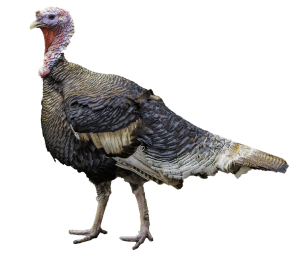
“The prince is sick! He’s crazy!” everyone in the palace whispered to one another. Four months ago, the teenager was found crouched under a table, naked and gobbling like a turkey! He refused to speak, or dress, and would only eat grass! All the alchemists, psychotherapists, behavioral modification experts, and even an animal trainer could not help. The King disguised himself as a peasant and set out in search of someone wise enough to bring his son back. As the King rounded a corner on the road, he saw an old man planting a tree that would not fruit for many years. The peasant-King said, “Sorry to interrupt, but why are you planting this tree? By the time it bears fruit you will no longer be with us.” The elder responded, “Many years from now, someone very hungry will come along this road and refresh themselves with this fruit, just as trees planted by others have refreshed me.” The King begged the tzaddik to come to the palace and heal his son. The old man told the King, “No matter what I do, no one is to disturb me. Leave your butler outside the door to fulfil my requests.” The King agreed. As they approached the Prince’s door, the sage dropped his clothes. He squatted and waddled over to the Prince, who was under the table pecking at seeds. The elder began gobbling like a turkey. “What are you?” spoke the young man-turkey, who hadn’t spoken for several months. The sage curtly replied, “I’m a turkey.” He gobbled and pecked at the Prince’s seeds. “Oh,” said the prince, “OK.” They gobbled, pecked, and preened their wings for the next hour. Then, the sage said his good-bye and waddled out of the room. The next day he told the butler to put less wood on the fire so that the Prince’s room would get cold. The sage waddled into the room naked and took his place near the boy. Shortly, the Prince began to shake with cold. The turkey-elder signaled the butler to bring them some warm clothes. As he put his on the shivering Prince said, “Hey, Turkeys d-d-don’t w-w-wear that!”
The old man replied, “Well, I’m a turkey, right?” The boy stammered, “R-r-right.” The turkey sage said, “And when I’m cold I wear clothes. No reason a turkey can’t get dressed.” After a few moments, the Prince said, “Yes, y-y-you are r-r-right.” He put on clothes and they gobbled, pecked, and preened for several hours. The next day, the butler was instructed to cook the teen’s favorite foods and set them on a table in the hallway, and to leave only a little of the usual seeds and grass. Both dressed turkeys gobbled until the sage said, “I’m hungry and this stuff just isn’t good enough, I want regular food.” The butler set steaming platters of delicacies in front of the fowl. As the sage munched on a bean and cheese burrito, the Prince cried out, “What are you doing?” Between bites, elder replied, “I’m eating good food, mmmm!” The Prince softly asked, “But, but – turkeys don’t eat this…do they?” The sage bellowed, “Why of course we do! It’s damn good!” The Prince took a bite of a piece of medieval pizza and was relieved to immerse in the familiar flavors and texture. As you who are reading this story might guess, step by step the sage encouraged the young man until he finally returned to his family, a Prince again! But this is not the end of the story. You see, as the sage was readying to leave, the Prince took him aside in a panic, saying, “What am I going to do without you!? It is good to be with my parents again, but no one knows that I am a turkey!” The sage held him by the shoulders and wisely said, “Listen, I know you are a turkey, and you know you are a turkey. Be who you are on the inside as you walk through the world on the outside. You will never go wrong.” As the elder tapped his chest he parted with this: “And remember, I will always be with you in your heart.” And with that, he left. The Prince became a most wise and understanding king. And every so often, the palace servants would awaken to the early morning sound of “gobble gobble!”
Little Ya’akov’s Healing
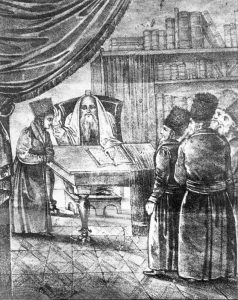
It was so sad. Just after Ya’akov’s tenth birthday, he was stricken with an illness that left him with two paralyzed legs. His Chassidic parents were saddened even more after months of visiting doctors who only shook their heads. There was no known cure in Ya’akov’s 19th-century world. So, the family stopped traveling to big cities and brought their son home to their small village in southern Poland. Their town was nestled, on one side, below some tall mountains (not unlike our Ko’olaus) and boundaried by a large river on the other side of town that had only a narrow bridge connecting it to the rest of the country.
Daily Ya’akov’s parents would push him in a simple wheelchair to shul and school. Each night they would fervently pray that HaShem would send their son a healing. Then it came – the good news that the great Rebbe-master and healer, Reb Naftali of Ropshitz, would be coming to perform a wedding in their little town. They know that he could heal their son where the doctors failed. The only problem was that Reb Naftali was so popular that when he would enter the town he would become surrounded by swarms of the townspeople and they could never get their Ya’akov close enough to be healed.
Two night before the Rebbe was to arrive they made a plan that would put their son before the great healer. They reasoned that since there the only way to enter the village was over their small bridge, they would wheel their son out to the middle of the span and then the Rebbe would have to see him. When he heard of the plan, Ya’akov, a very shy boy, told his parents that he could not speak to the Rebbe, let alone ask for a healing. Since the parents were also shy they decided to make a sign and place it around their son’s neck. It said, “Reb Naftali, I cannot walk, please heal me – Ya’akov.” The day came for the Rebbe’s arrival and Ya’akov’s mother and father brough him out early to the bridge. After a couple hours they heard the Rebbe and his entourage coming because while traveling he would encourage his Chassidim to sing. Quickly, the parents rolled onto the bridge to block it, and then they retreated to stand behind a tree on the town-side.
When the Rebbe saw this little boy sitting in a chair on the bridge one of his followers offered to move the boy. He said, “No, I will do it.” He walked up on the bridge and stood before Ya’akov, who looked down at his sign. The Rebbe looked at it too and read out-loud, “Reb Naftali, I cannot walk, please heal me, Ya’akov.” Then the Rebbe took a great breath – the kind of breath filled with the sadness of the world, one that would be expelled with the greatest of sighs that only a master healer could express. Then the Rebbe shouted: What’s the matter with you! You are blocking the bridge! Get out of my way you little pisher! At that moment, Ya’akov jumped up and ran away…
The Seder
There were traveling two beggars, a Jew and German who were always looking for opportunities to get a free meal or a place to stay. One year they arrived in a big city around Pesach time. The Jew told his German friend, “Gustav, we are in luck – this city has lots of Jews and it’s Passover time. We have a tradition of holding a big feast and it’s a mitzvah to have poor guests.”
“Ach du lieber!” Said Gustav, “I vood very much love to each at zuch a feast!”
The pair attended a synagogue service on the night of the first night of Pesach and each was invited to a seder. The German beggar, not knowing anything about the table service was happily curious to engage in the first glass of wine and the eating of the salty greens. He even got into some of the singing and took a brief nap during the long reading of the midrash.
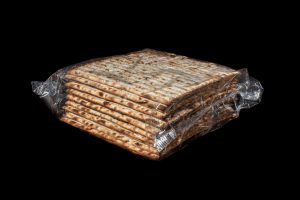
As the seder approached the brachot over the matza the hungry German was excited to finally eat. He munched on the dry cracker he was given and hoped there would be more. There was. The host passed out the maror and all were instructed to heap some onto a piece of matzah. As the unsuspecting German bit into and chewed the bitter herb he let out a scream and spit out the maror! He then ran screaming from the room in frustration and spent the next couple of hours stewing on a cold snowy rock at the town’s edge where he earlier planned to meet up with his Jewish comrade.
When the Jew arrived, feeling warmly mellow with a full stomach, he was verbally assaulted by his shivering friend, “How could you have sent me to that farce of a meal!!?? They not only sang and prayed for hours until we got the first morsel but then they tried to poison me with a fiery root that almost burned my insides out!”
“What did you do? – asked his friend.
“Do!!? – I ran out of there as quickly as I could to avoid any other spoiled foods from crossing my lips!”
“Oh,” Sadly replied the Jew, “If only you had stayed a little longer you would have had such a blessed feast. You see, you went pretending to be a Jew but you did not learn the first requirement of being a Jew: No matter how painfully the world treats you must live in patience and trust that the future will be better.
To Break Open the Gates: A Tale of Healing

You know… there are at least two kinds of holy people. Although they both live a holy life, the first one looks down on people they consider “not holy” and the second one values everyone they meet. This story discusses both:
There was once a poor woman who was abandoned by her husband after she gave birth to their son. Filled with the strength of her love for her child, she found a way to raise him and keep him safe and fed. Unfortunately, a terrible flu invaded her little Polish village and soon her son was stricken with it. The town doctor took one look at the boy and shook his head, telling her to “make him comfortable so that his end will harbor no trauma.” A woman of deep faith, this mother sent for the holy Ba’al Shem Tov, the great healer and founder of the Jewish heart path called Chassidism. The BESHT, as he was also known, came quickly and, seeing that the child was rapidly drawing near to death, sent his accompanying students to seek out and return with ten local thieves and burglars.
The town’s rabbi – a stickler for observing laws and morals – walked into the poor woman’s home just as the student arrived with their crew of Jewish criminals. The rabbi was aghast but held his tongue as these men joined the BESHT in praying for the recovery of the small boy who laid before them. From time to time the house shook with their voices pleading for the life of this little one. When it was over, and the thieves left to do their business, the doctor was called and upon examination of the child he declared in a voice of shock and joy that “the boy will live!” The mother wept on the BESHT’s shoulder in thankfulness and he left her with a small amulet to keep in her house for ongoing healing.
As the BESHT and his students were leaving, the rabbi, puffed up with righteous indignation, demanded of the healer an explanation. “Why?” boomed the rabbi, “did you not make a prayer minyan with upstanding members of the community instead of the evil rabble you brought here?!”
Calmly the Baal Shem Tov responded, “The boy was extremely ill, and the Angel of Death was approaching rapidly. I had to work fast to get the most powerful Jews to break open the Gates of Heaven – and who is better than a minyan of holy Jewish thieves and burglars to open the gates and bring the light of healing into this house?”
Sukkah on the Roof in Brooklyn – 1957
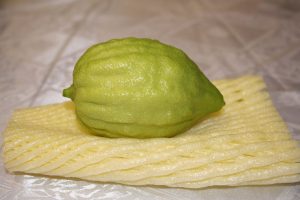
My uncle would bring this up every Fall as we munched on our post-Neila break-feast. Between bites of pickled herring and potato knishes, he’d tell us all about his struggle to keep his sukkah. He recounted, once again, that, “like a good Jew,” he always built his sukkah on the roof of his apartment building. He was quite proud of it and could hardly wait to celebrate the holiday with a little feast-ele’ and lots of singing. But in 1957, his new neighbor, a Jew in fact, complained to the building Superintendent that the sukkah was a fire hazard and should be taken down.
The Super, a good Jew and a buddy of my uncle, ignored him. So the neighbor went to court and got a court date on the third day of Chol ha-moed Sukkot. My uncle had to go. Still, we had a raucous good time for the first two nights of the holiday, singing, eating and playing around with my uncle and our sizable families. A couple days later the neighbor and my uncle faced Judge O’Hananhan. He heard the vitriolic attacks the neighbor made on my uncle – “how irresponsible he was,” and how the Super “was in cahoots” with my uncle, endangering the apartment building. When it was uncle’s turn, he just said that it was a religious ritual structure that would be down in several days after the holiday passed. The judge was silent for a few moments. Then, with the lightest hint of a verbal eye-wink, he pronounced the following ruling: “You, Mr. Rosenbloom, must know that your neighbor is correct – the structure is a potential fire hazard and you should have had local fire officials inspect it for safety. It is therefore in my judgement that you should take this “sukkah” down within the next seven days.” Every time my uncle told this story he gleefully barked out a laugh and said: “So boychik, I got to keep it up ‘till the holiday ended! And from that day forward I always got permit from the fire house down the street.” The fire captain was his high school mate.
Moshe The Hood Makes Teshuvah
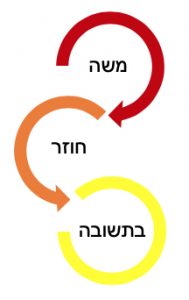
It was unbelievable but true – Moshe the Hood, the biggest crime boss of Poland, wanted to make Teshuva. He was in his 50’s and had lived what some would call a “very evil life” filled with theft, violence, conspiracy, betrayal, and many, many lies. Now he was childless, wifeless with few real friends (who has time when you can take what you want and make no time for loving relationships and responsibilities!?) He was filled with remorse for all the years wasted on Gashmiut (materialism) and power. Moshe admitted to himself that he needed to turn his life around; to make Teshuva no matter what the price. So, unbeknownst to any of his henchmen or his circle of crime bosses, he secretly made his way to see the great Rebbe, Reb Elimelech. With hat in hand he met the Rebbe in his office and said: “Rebbe, I feel so overwhelmed by what I have done all these years that I cannot sleep and barely eat. I am sick of myself, Rebbe, and I’m willing to do anything to be able to change my life and be forgiven for what I have done.
Reb Elimelech told him: “Moshe, the first step a man like you must take to make Teshuva is that you must write down everything you’ve ever done that has hurt others or yourself. Also, write down all the transgressions you have committed against HaShem and all the ways you have strayed from the Jewish path. After you have listed each one, sell all that you own, turn it into cash and place it in a large bag; bring the money and the list with you to see me again and be prepared to make Teshuva.” Without question, Moshe the Hood returned home and in one month he completed his list of 3500 incidents of transgressions, sold all that he had and placed the large sum of cash in a large carry bag. He set out to see the Rebbe once again prepared to make Teshuva. Reb Elimelech told him to place the bag on a table and come stand before him. The Rebbe took the list and after a brief perusal he was shocked and nearly yelled, “I can’t believe you did all of these things! How have you lived with yourself all these years!” Moshe felt as if he were being slapped but said nothing, feeling even worse. Then the Rebbe began to read each wrongdoing and after each one he’d say something like: “This is absolutely horrible; how could you do that to that little girl’s hair in school! Or, “You’re such a Vildeh Chayah (wild animal) to do such repulsive things! “What gives you the right to bring such evil into the world you heartless monster!?”
After about ten minutes of this Rebbe harangue, Moshe felt so tense and overwhelmed that he fainted dead away. The Rebbe had a glass of water on hand and he doused Moshe. Once revived, he took his position before Reb Elimelech who continued reading the list and heaving at Moshe loud, angry words of reproach. Moshe fainted at least thirty times before the reading was complete. At this point, the arrogant, powerful crime boss felt very weak, exhausted, and hopeless. Moshe awaited the Rebbe’s judgement as to what he needed to do in order to make Teshuva and receive complete forgiveness. The rabbi looked into his eyes and said very softly and with regret:
“Moshe, for these sins there is only one way you can be completely forgiven and bring new life to your soul – you will have to die.” And as if that news was not bad enough, the Rebbe continued: “In the days of the Beit HaMikdash, the Ancient Temple, the mode of execution for this level of evil behavior was to pour hot lead down the throat of the transgressor….So Moshe, are you prepared to die to make Teshuva?” A quiet “yes” was all Moshe said. “Good,” replied the Rebbe, “So you will now do this: Take a little money from the bag and go to town. Buy lead, flux and some coal and bring it here.”
Once Moshe acquired these materials and returned, he found the Rebbe standing before a great fire blazing in his fireplace. Next to it was a large stone with a big spoon and thick cloth nearby. Reb Elimelech instructed him to throw the coals into the fire and stoke it with the spoon until it turned the coals deep red. Moshe picked up the spoon holding its end with the cloth and did as the Rebbe directed him. Once the coals burned red, the Rebbe said: “Now, take the lead and flux, place them in the spoon and hold it over the coals until they have melted. Moshe lifted the spoon filling it with lead and flux and held it over the intense heat of the burning coals. Once they melted red hot, Reb Elimelech told Moshe to set the spoon on the rock and lay on the ground before the fireplace. Once Moshe did so, the Rebbe tied a handkerchief over his eyes and solemnly pronounced: “You Moshe, the criminal, murderer, conspirer, betrayer, and liar; you, who rejected the holy ways of your fathers and mothers and broke all Mitzvot; you shall now die in order to make full Teshuva and receive full forgiveness. You shall be no more in this world because of the harm you brought it and its inhabitants. Now Moshe, known as Moshe the Hood – prepare to die.”
It was strange…Moshe noticed that he was not afraid. Instead, he felt ready to sacrifice himself to be right with his people, with the world, and with HaShem. He felt completely ready to give his life in order to turn his soul around and return to the path of what is right, loving and balanced in life. Soon he would not feel the angst that haunted him all these years. The Rebbe said: “Now Moshe open your mouth and receive your death.” Moshe opened his mouth and…. the Rebbe put a spoon into it and…. Moshe felt his mouth fill with the tangy sweetness of orange marmalade!! He swallowed, sat up and removed the kerchief from his eyes, asking in confusion: “But Reb Elimelech I was supposed to…”
“Sha!” interrupted the Rebbe, “Moshe the Hood is dead; he has left this earth as a forgiven man who made genuine Teshuva. You are someone else….so now, I want you to take that bag of money sitting on the table, go out into the world, perhaps another country, and do good in the world.”
The new man thanked Reb Elimelech, picked up the bag, and walked out the door into a new life.

The Princess Who Wanted to See G-d

“Why not!??” yelled the princess, “Why can’t you show me!??” The King looked down at his ten year-old daughter and felt the bittersweet conflict every parent goes through when they want to fulfill their child’s request and know that they cannot.
“My darling,” he pleaded, “I do not know how to show you G-d.” As soon as he spoke, he regretted it because, after the Queen’s recent death, he wanted to do what he could to provide for two parents. Looking into her frustrated face he recalled that his daughter, unlike most of the children in the court, did not cry. She just stood there before him, demanding a deity viewing. Then, he hit upon an idea. “I shall call upon some of my wisest advisors – perhaps they will show you G-d.”
As she nodded in assent, the King called his Royal Minister of Justice. “Minister,” he asked, “Can you show my daughter G-d?” After a quick moment the long, lanky official responded, “Why of course your Majesty,” and he invited the Princess to follow him and ascended one long staircase after another until they reached the near top of the palace. There they stood before a pair of tall, oak doors. “Here your Highness, behind these doors you shall see G-d.” He pushed the doors open to a gigantic room filled with bookshelves and books. “In this room is the accumulation of all the world’s diverse knowledges – surely you shall find G-d here.” The Princess looked at some of the books, noticed there were no comic books, and angrily shouted, “This isn’t G-d! It’s just a bunch of books! I want to see G-d!” The Minister brought her back to the King and profusely apologized.
The King then called his Royal Treasurer, who was a bit on the portly side, and asked him to show his daughter G-d. “Yes, of course your Majesty,” said the Treasurer, “come, your Highness, and I will show you what you seek.” He led her down one staircase after another until they stood before an iron door located in the bowels of the palace. It was dark and the Treasurer brought a wood torch. He pushed the heavy door open and lit the torches that lined the walls of a great chamber. The princess was faced with piles and piles of diamonds, emeralds, rubies, gold coins, silver chalices and every sort of bejeweled object of precious metal. “This chamber, your Highness,” said the Treasurer, “is filled with the wealth of the entire world. Certainly this is the power and grandeur of G-d!” After the Princess spent a little time handling the rubies and other gems, she exploded, “This is not G-d!!! It’s just a bunch of colored stones and metal. I want to see G-d, ‘gee-oh-dee,’ G-d!!” The Treasurer quietly returned her to her father, whispering into his ear, “I’m sorry your Majesty, but I’m afraid she may have mental problems!”
The King realized it was up to him to solve this problem. So, in the early evening, he dressed as a peasant and snuck out of the palace. As he rode an ordinary horse down the road, he hoped to discover a wise person who could show his daughter G-d. This did not take long, for as he traveled down the road, he saw a curious sight. There alongside the road was an old woman planting a carob tree. The King-peasant dismounted and spoke with the woman. “Pardon me, good woman,” he began, “but I was curious to know why you are planting this particular tree. Perhaps you know that it takes many years for it to bear fruit and, sadly, you may not be in this world when it produces.”
“Ah yes,” she said with a spark in her voice, “But many have planted trees before me, and I have benefitted. I thought to plant one to benefit those who come after me.” Well, the King instantly recognized a wise woman and asked her if she would come to the palace and show his daughter G-d. “Yes,” she responded, “I shall – but with these necessities: I need a room and certain furniture to put into it. No one but myself shall go into it. I also require a horse and carriage and permission to take the Princess to where I wish.” Although the King was a little unsure, he granted her these things. After preparing the room to her liking, the old woman invited the Princess into the carriage that waited outside the palace gates. “Let us take a little journey,” she said, “One that will eventually lead you to see G-d.” The Princess was skeptical, but she went along.
According the elder’s instructions, the carriage driver drove through the richest part of the capital city…then through the middle-class area…and the laborers district, until… he stopped at the outskirts of the city, where the poorest people lived in makeshift hovels and tents. When the wise woman and Princess stepped out of the carriage, they faced a rug-covered hovel. “This is disgusting,” kvetched the Princess, “I can’t see G-d here!”
“Patience,” whispered the woman, “You will see G-d soon enough.” Then she led the Princess into the hovel, where they saw an amazing sight. Facing them was a skinny little girl about the age of the Princess, sitting on a high stool with a blanket on her lap. She was stirring a large pot of soup and singing with great gusto, “La, la, la, la.” The girl was completely and joyfully lost in the tune.
Suddenly the Princess barked, “What the matter with you, don’t you see royalty standing before you! Rise up now and acknowledge your Princess!!” The girl stopped singing and put the spoon down. What was once a joyful face had now become sad and ashen. She carefully raised the blanket off of her lap to reveal that she had no legs. At that moment, the old woman guided the now bewildered Princess back to the carriage which made its way back to the palace. Once there, the old woman took the girl to the specially prepared room where they saw a chair facing a long wall carpet. The girl sat before this and the old woman gently said, “Now, now you will see G-d.” Instantly she pulled down the hanging to reveal a large wall mirror. As the Princess looked, she could see many tears flowing down her face.
“There,” said the old woman, “there you see G-d….deep within you…Now, what do you want to do with that vision?” After a few moments, the Princess wiped her face, went to her room to gather some of her favorite things, and to the kitchen to collect freshly cooked food, and, with the old woman, she returned by carriage to visit the singing girl.
Who Guarantees that Jews Will Receive and Keep the Torah?
The women and children, of course! It’s because of them that that we received and continue to practice the Torah. We learn this from Millennia-old Rabbinic Midrashim. A Midrash is a special commentary on the Torah that uses metaphor and story to convey its wisdom. The following stories come from my adaptation of Midrash Tanchuma and Pirkei de-Rabi Eliezer, respectively:
from Midrash Tanchuma – When the Holy Blessed One was about to give the Torah to Israel, He held it back and asked the Elder Wisemen, “Who will guarantee that you will keep My Torah and regularly engage in its wise practices?” The Elders talked it over and then replied, “Avoteinu orvim otanu, our ancestors will be our guarantors.” ‘Big G’ said, “Nope!” So the old guys conferred with each other again and then said, “Nevi-einu arevin, our prophets will be our guarantors.” And Hashem said “Even your ancestors and prophets needed their own guarantors!” The men were stumped! “Now what?” they despaired. Eventually, one of them lead his fellows to a gathering of the Elder Wisewomen, who had been watching this entire interchange. This time, ALL the Elders, men and women, talked it over and presented HaShem with this proposal: “Baneinu orvom otanu, our children will be our guarantors.” Hashem replied, “Indeed these are the best guarantors. For their sake I will give you the Torah.”
Then HaShem gathered all the children at the bottom of Mt Sinai. He also invited the pregnant mothers and turned their bellies into glass so the child within could be part of this assembly. Then HaShem asked the children, “Will you make sure that your parents and grandparents, aunts and uncles, and all the grownups will keep my Torah and that they teach you what it’s all about?” The children as one voice yelled “Yes!” – and the babies in the bellies added, “Bluh-Bluh-Bluh!” At that moment, the Torah was given to the community.
from Pirkei de-Rabi Eliezer– On the eve of Shabbat, the Israelites stood at Mount Sinai, with the men and the women standing apart. The Holy One said to Moses, “Go, speak to the daughters of Israel and ask them whether they wish to receive the Torah.” Why were the women asked first? Because the way of men is to follow the opinions of women, as it says in Exodus 19:3: “Thus shall you say to the House of Jacob…” – these are the women – “…and declare to the Children of Israel” – these are the men. After the women agreed to receive the Torah, the men joined them and they all replied as with one mouth, “All that HaShem has spoken we will do and obey” (Exodus 24:7).

Pinchas Monkey Street
Story retold by R. Daniel Lev
Reb Pinchas worked as the business manager for a Poretz, Polish aristocrat, named Brunon. Each Friday morning he’d go to Brunon’s office where the Poretz would open a small chest and count out several gold coins to pay Pinchas for his services. As the coins fell into his hands, Pinchas would raise his face towards the heavens and say, “Thank you HaShem for supporting my family.” The Poretz would think to himself, “G-d!? He’s thanking G-d!! – I’m the one paying him!”
After a number of months of this, the Poretz decided to show this Jew just who buttered his bread – he planned to fire Pinchas at the beginning of the work week. What’s worse, he planned to do it two weeks before Passover. Brunon called Pinchas into his office and haughtily proclaimed, “You are fired Jew, now let’s see how ‘G-d’ will pay you your wages!” Pinchas was stunned and he slowly walked back home. He was worrying about how to feed his family, and he dreaded telling them that this Pesach would be a very, very humble celebration. He could barely afford matzah with the little money he had left over from the previous week. When he told his wife she encouragingly said, “We will make do.”
Each evening, after Pinchas returned home from fruitless job hunting, he would help his wife put their four children to bed and then he’d sit at the kitchen table by the window and study Talmud until late in the evening. Each holy word he pronounced was a pleading prayer for help, mingled with his tears of despair.
One night, about a week before Pesach, Pinchas was learning Torah in his usual place. Suddenly something smashed through the window and landed on top of his Talmud. When the shock faded, he looked and saw something most strange – a dead monkey lay before him. Now, any ordinary person would have thrown it back outside. But Pinchas, the careful manager, took a moment to examine the poor dead beast. He then saw something extremely weird and joyously satisfying. Protruding from the ape’s mouth was a gold coin! When he took the animal outside and cut it open, he found dozens and dozens of gold coins! – enough to make the most splendiferous Pesach anyone could have, and to start his own business and provide for his family.
The night of Pesach, a few hours before Pinchas and his family and friends were to light candles and begin the Festival, there was a loud knock at their door. Pinchas, dressed in fine new clothes with a silver trimmed Kittel, opened the door to see the smug face of his former employer facing him in the doorway. The Poretz took a U-turn and frowned when he saw Pinchas standing there in all his finery. He then mumbled to himself, “Its true…G-d did pay him all these months.”
Pinchas, being a gracious host, invited Brunon into his house to sit in a nearby chair. The deflated Poretz told this story:
“I was mad at you for thanking G-d all the time when I paid you, so I fired you and wanted to you suffer by having a bad Passover. Then one day, one of the grounds-men brought me my pet monkey, who was dead. He had been missing for a while and I had no idea where he went. I had the man go to your house that night and throw it through your window. Later the next day, I noticed that my coin chest was missing most of the money it held and I could not find it anywhere. So now, this evening, as I stood in the doorway, I was hoping to make myself feel better by gloating at your poverty. But here I see that G-d paid you your wages anyway. I am so sorry for doubting you and treating you so badly…”
The Poretz stayed for the meal and learned about freedom, liberation, and love at the Seder. After the holiday was over, Pinchas took some of this money and donated it to the shul. It is said that the community built a new side street alongside the new synagogue and named it “Pinchas Monkey Street.”
Moshe the Miser
As told by Reb Daniel Lev
Moshe was a wealthy butcher and the town miser – he was so stingy that even the most miserable, and accomplished, beggar would be completely ignored as Moshe walked down the street. Shnorers from the shul would walk the other way when they sighted Moshe. But Moshe had his own problem, a big problem – his wife of eight years. Not only did they have no children, but his wife would nag him every minute of the day and night, “You don’t make enough money because you’re a shvach businessman,” and “what kind of husband are you! – a nothing husband, that’s what!” Of course Moshe contributed his own nagging and arguing so the weight of this problem was not only on his shoulders.
He thought of divorcing her or running away. But first, he considered himself a good Jew and would never break a ketuba, and, second, he had a thriving business in town and did not want to leave it. For a long time he felt painfully stuck. Then he came up with a fantastic idea – he could kill her! But how could he do that, he thought. After all, he was a good Jew. He thought long and hard but could not come up with a solution. So Nu! – where does a good Jew go when she or he can’t solve a problem?…to the Rabbi of course! The spiritual master Rebbe Naftali welcomed Moshe when he came through his study door.
“Moishe, you look sad my friend. Come, sit down and tell me your troubles.”
“Well Rebbe,” Moshe coughed, “My wife is driving me mad with her kvetching and criticism and I have reached my end. I decided what I need to do but don’t know how. Rebbe, can you help me? – can you tell me how I can kill my wife?”
A number of quiet moments passed. The Rebbe said, “Just a minute.” He walked over to a bookshelf and, reaching high up to a dusty shelf, he brought down a large tome. After he slammed it down on his desk, opened it, and read quietly for a moment, he responded: “Moishele – are you sure you want to do this?”
Moshe almost jumped out of his seat and answered, “Yes Rebbe, but I don’t know how to kill her without murdering her – which I cannot do.”
“OK then,” said the Rebbe, “It says here, ‘If a husband wants to end the life of his wife, he must fail to give tzedaka on an important holiday.’ Now it happens that Rosh HaShanah will arrive in two weeks. It says here, ‘If a man pledges, say 10,000 rubles, to the Shul leaders on Rosh HaShanah, and he does not pay, soon the Malach HaMavet (Angel of Death) will come, and before Yom Kippur his wife will be dead.’”
“Rebbe, that sounds wonderful! What should I do?”
In the Shul on the morning of Rosh HaShanah, Moshe followed the Rebbe’s advice and called over the Gabbai. “I would like to get an Aliyah. Standing before the Torah, I want to announce there that I will donate 10,000 rubles to the Shul. The Gabbai nearly fell down when he heard Moshe the miser saying he wanted to give something! Eventually, Moshe was called up and presented his verbal promise to give the money. The congregation took a collective, sudden intake of breath. They could not believe it.
A day after Rosh HaShanah, members of the Shul board knocked on Moshe’s door. When he answered, they said, “Reb Moshe, we’ve come to ask a little advance of the donation to help our poorer congregants to make a break-fast.”
“Donation! Donation!” replied Moshe, “I made no donation. You are all mistaken.” And with that pronouncement he gleefully slammed the door. Now he waited. One day…two days…on the third day he became worried. His wife was yelling at him with even more force. So what do you do in such a situation? – ask the Rebbe.
“I don’t understand Rebbe – I did what you said but she is still very alive.”
“Just a minute,” said the Rebbe. He again went to the bookshelf, brought down the tome, read from it, and said, “Oh Reb Moshe I’m so sorry – I forgot to tell you something very important. You see, the Malach HaMavet is little bit stupid and does not know that she is your wife. You have to exaggerate a little to draw him to your house.”
“But Rebbe, what can I do to show that she is my wife.”
“That is simple, my holy Jew. All you need to do is to pretend that she is like the wives of the other men. Go buy her small gifts, like flowers or a box of chocolate. Maybe take her to dinner. That should help the Angel of Death to find her.”
“Oh Rebbe, thank you so much!”
Moshe went out and bought a big bouquet of flowers and a large box of his wife’s favorite candy. “That’ll get her,” he happily thought. At home, he loudly knocked on the door and when she answered, before she could say a word of annoyance, he thrust the flowers and candy towards her face and said as joyfully as possible, “These are for you, my dear.”
“Moshe?” She received the beautiful flowers and looked up at her husband. She took the box of candy and again looking up in confusion thought, “Moshe?” She dazedly walked around the house for an hour holding the gifts. That night they did not argue.
The next day Moshe bought her a bottle of her favorite wine. As he opened his door, he took a deep breath through his nose and passionately observed a familiar, but long ago experienced, fragrance. “Kishkeh!” He said. He nearly ran to the kitchen where his wife was taking his favorite meal out of the oven. He placed the bottle between their settings as she placed the steaming dish on the dining room table. “Oh, what a beautiful bottle of wine, “ she said. They sat, ate, drank and even giggled a little.
As you might guess, day after day they grew closer and closer until the morning of Erev Yom Kippur Moshe woke feeling very happy with his marriage. As he turned to share his joy with his wife he saw that she looked a little green.
“Oy Moshe, chah, chah, chah,” she coughed, “I don’t feel so good.”
After giving her some water he rushed over to the Rebbe’s house and got an emergency visit with him.
“Oy Rebbe, my wife is dying!”
“Oh, that’s good, Reb Moshe.”
“NO! I don’t want her to die!” pleaded Moshe.
Confused, the Rebbe asked, “You want her to live?”
“Yes!” – begged the distraught butcher.
“Just a minute.” The Rebbe again pulled down the big book and read. Looking up to Moshe he asked, “Are you sure?”
“Yes!!”
“OK,” quickly answered the Rebbe. “In that case, it says here that you will need to give the 10,000 rubles to the Shul today.”
Without a pause, Moshe ran to the bank, took out the money and immediately gave it to the Shul elders. His wife recovered, and from that day forward he was known as Moshe the generous. And they lived happily ever after!
The Kabeel’s Donkey – A Children’s Story

Once upon a time in old Yemen there was a town where Jews and Muslims lived in peace. It was called Dhamar. The king of Yemen would assign a Mayor (called a Kabeel) to each town and, unfortunately, the one he chose for Dhamar was very mean. He did not like the fact that there was peace between the Jews and Muslims. He was determined to do bad things to the Jewish community.
His first action was to make a new law in the town that all Jewish orphans had to live with Muslim families. These orphans were not allowed to be brought up as Jews.
Now, on the outskirts of the town there was a little Jewish orphanage run by Rabbi Yosef. He and the six kids who lived there had a very happy life. Each morning they would get up, get dressed, say their prayers, have a nice breakfast and then go outside to sit under the big beautiful tree that stood a few yards from their house. The tree had big leaves and it gave them a lot of shade. It was a great place to learn Torah from Rabbi Yosef – who also taught them Hebrew, and math, and many other interesting subjects.
The Rabbi was not only a loving teacher, but he was very wise. He heard about what the Kabeel wanted to do and recalled that this mayor was not too bright. So, Rabbi Yosef started thinking of a plan that would keep his orphans with him so they could continue learning and living Torah.
A few days later the Kabeel himself came riding up to the tree where Rabbi Yosef and the children were singing Hebrew songs. The Kabeel got off of his donkey, interrupting the singing, and walked right up to the Rabbi and shouted, “You are not following my edict! I said that all Jewish orphans must be placed in Muslim homes and I mean it! Do you want to be punished?!”
“Oh your Excellency,” replied Rabbi Yosef, “I heard your edict but, you see, these are not Jewish children – they are donkeys. I did not want to insult the Muslim mothers and fathers by sending those donkeys to raise as their children!”
“What!” yelled the Kabeel, “these are children sitting here!”
Rabbi Yosef sadly lowered his head, sighed and said, “Oh your Excellency – I’m sorry to say that the children I had here ran away as soon as they heard of your edict. I became so lonely and bored that I just had to teach someone Torah. So, I took a small heard of young donkeys I kept for the children and I sat them under this tree and began teaching them Torah. After only a week they began to turn into what you see here as children……but really, on the inside, they are donkeys.” At that point the kids began to shout out noisy donkey-laughs!
The Kabeel was appalled! He didn’t want to send donkey children in the homes of Muslims! In his pea brain he came up with an idea to test the Rabbi. “OK” he said, “I want to see if you can truly do what you say. I will leave you my donkey and I will return in a week.”
After the Kabeel left, Rabbi Yosef and the children took the donkey to a faraway town and sold it for a good price. He spent the money on a nice meal for the children that included sweet cakes. They then returned home and before long they returned to their daily life of Torah. True to his word, the Kabeel returned a week later riding on a horse. He jumped down and demanded, “OK Yosef, where is my donkey man!?”
“Oh holy Kabeel,” replied the Rabbi, “I cannot believe what a smart donkey you left me. Only after three hours did he turn into a man, and in three days I taught him all that all that I knew. He then traveled to the greatest university in Arabia and within another three days he learned enough to become a great lawyer. The king heard of him and made him the judge in the nearby town of Taziz.”
Everyone (but the Kabeel) knew about this judge – he was very strict and even meaner than the Kabeel.
The Kabeel was so excited to find out that his donkey man was a judge that he jumped on his horse and rode off to see him in Taziz. Upon arriving, he entered the court room and sat in the back. There he saw the judge (who had a hairy face and hairy ears). The judge yelled and condemned and punished all who came before him. “You!” he shouted at a fellow who stole an apple, “You will spend ten years in jail!”
The Kabeel was so impressed with “his” donkey man judge that he stood up and shouted to him, “Hello! Remember me? I am your master and I love what you do.”
The judge growled at the Kabeel, “Who do you think you are!? I am not your servant!” To which the Kabeel replied, “Oh yes you are, you are my donkey and I have known you since I saw your mother give birth to you in my barn!” The judge became white hot mad and shouted to his guards, “Arrest that man – I want him flogged right now!!!”
The Kabeel jumped up fast, ran to his horse and rode hard out of town and did not stop until he reached the safety of Rabbi Yosef’s orphanage. There, he jumped off his horse, and shouted at the Rabbi, “Yosef! Do not ever teach donkeys the Torah, they grow too proud and will try to kill you.” Pointing to children who sat under the tree he commanded, “Get rid of these donkeys and find those Jewish children. I will rescind the edict and allow the orphans to remain with you – just don’t teach the Torah to any more donkeys, it’s dangerous!”
The Ba’al Shem Tov Reads A Holy Book
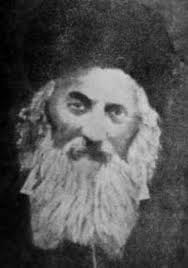
The Ba’al Shem Tov, also known by his acronym “BeSHT,” inspired the founding of the Hassidic spiritual movement of the eighteenth century. He brought great innovations into the religious identity and practice of the common Jew, avoiding the hyper-scholasticism and intellectual aristocracy of the Jewish world at that time and replacing it with a grounded, experiential spirituality. He was a supporter of the “everyman” Jew, inspiring many of us to live a deeper, more grounded life (thanks to the books and teachings of modern Jewish masters such as Martin Buber, Abraham Joshua Heschel, and rabbis Zalman Shalomi-Schachter and Shlomo Carlebach, alav-ve-shalom). The following story is a great example of the life-example teachings of the BeSHT.
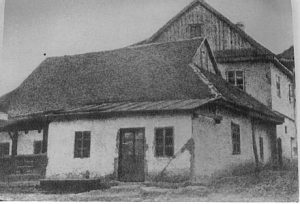 The young Rabbi Dov Ber’s volcanic frustration was nearly exploding after an entire Shabbat of what he considered soul-killing boredom. A great scholar in the mystical texts of the Kabballah, Reb Don Ber had travelled many miles to spend a very disappointing Shabbat with a man known as “The BeSHT.” He came to receive a healing for his many maladies and to see if there was any truth to what he heard about this “great miracle worker” and seer into the depths of mystical reality. What he got was three meals at which the BeSHT spoke of quaint little stories and a bit of singing. No healings, no great revelations of spiritual import. Shvach! Dov Ber bided his time over the late afternoon of Shabbat. When morning came he was packed and ready to gallop his coach fast and furiously back home to his books.
The young Rabbi Dov Ber’s volcanic frustration was nearly exploding after an entire Shabbat of what he considered soul-killing boredom. A great scholar in the mystical texts of the Kabballah, Reb Don Ber had travelled many miles to spend a very disappointing Shabbat with a man known as “The BeSHT.” He came to receive a healing for his many maladies and to see if there was any truth to what he heard about this “great miracle worker” and seer into the depths of mystical reality. What he got was three meals at which the BeSHT spoke of quaint little stories and a bit of singing. No healings, no great revelations of spiritual import. Shvach! Dov Ber bided his time over the late afternoon of Shabbat. When morning came he was packed and ready to gallop his coach fast and furiously back home to his books.
After a hasty, but polite, farewell to his host, the young scholar was about to get into his carriage when his servant approached carrying the last of the baggage. “Master,” pleaded the servant, “The BeSHT asked your permission to speak briefly with you one last time before you go.” Begrudgingly, Dov Ber went to see the folk healer in his study. There, the BESHT sat on one side of a large desk and motioned the rabbi into the opposite chair. Once seated, Dov Ber saw a classic mystical text in front of him and it was open to a discussion about angels. The BeSHT invited him to read what was on the page. “Now this is more like it,” Dov Ber thought, and he expertly proceeded to not only translate the Hebrew and Aramaic but to share all of the commentaries he memorized on this passage as well as to convey his own insights.
When he had finished, he proudly looked up at the BeSHT who looked peacefully unimpressed. “That was very thorough,” he told Dov Ber, “but let me show you what the text can reveal.” As the BeSHT placed the page in front of him, Dov Ber contemptuously wondered what more could this country bumpkin teach him about this already “thorough” exposition of the holy words.
In a booming voice, the BeSHT began to chant the word for angel, “MALACHIM….” – and suddenly the room filled with blue fire falling like ocean waves upon the books and desk! Reb Dov Ber dived under the desk as he heard the powerful rush of wings flapping all around him and piercing angelic voices shaking the entire room…..When the BeSHT stopped reading, the bewildered and frightened Kabbalist emerged from his hiding place and plopped back down on the chair. The BeSHT look deep into Dov Ber’s eyes and said, “Now that is how you read Torah!”
Dov Ber never returned home.
All the Way to Simchat Torah!
Contributed by Rabbi Daniel Lev, adapted from Reb Shlomo Carleback
Elyah the Chassidic shoe maker was in a quandary – what should he do!? Here he was on Erev Yom Kippur, on the eve of the holiday, and he had planned the whole day just right. He got up, dressed, and went to the Shul of his rebbe, Reb Shlomo the Shlivovitzer. After arriving, he donned his tallis and began doing a little Torah study before Davvening the morning service. After that, he planned to have a little breakfast, study a little more, and clean up his shoe shop before going home to help his wife prepare for the Holiday breakfast meal. He’d immerse in the mikvah towards the end of the day and sit in Shul meditating until Kol Nidrei would begin. He figured that this would prepare him for all the holidays that would eventually end with the joyful celebration of Simchat Torah.
But before he could say one word of prayer, in walked the Shmeriyahu the salesman, who was kvetching (wailing)! “Oy gevalt, gevalt! I just traveled three miles from the town of Shplotz and a terrible thing is happening there! A little Jewish family is being held captive in a pit at the house of the town Poretz (Landlord) and if they can’t come up with the overdue 10,000 ruble rent money, he will kill them!”
“When does he need the money?” asked Elyah.
“Oy, this is even worse – he needs it by sunset today!!”
What a quandary! Here is Elyah, already to prepare himself for the holy Kol Nidrei, and yet this family needed help. What could he do? He dropped everything and ran the three miles to Shplotz. Once there, he started going door-to-door in the Jewish quarter to ask for money to ransom the Jewish family. This is a big mitzvah in our tradition. Unfortunately, by the afternoon, he had only collected $1000, a sizable amount for a poor community, but not nearly enough.
As Elyah wandered into the town’s center, he saw three Jews sitting and drinking at a table outside the local Kretchmer (tavern). By the way they were dressed, with all three sporting uncovered heads, he understood that these were not just secular Jews, they were wealthy.
He felt emboldened by his mission to approach and ask them for a donation.
“Ha!” barked the one called Shimon. “You Chassidim are always asking for money to feed your greedy rebbes!” He was a bit drunk yet good-hearted about his insult.
Elyah was not dissuaded, “No brothers, this money is for a family held captive by the town’s Poretz who has threatened to kill them if I don’t raise another nine-thousand rubles.
Suddenly, Reb Shimon had a sparkle in his Miyeskeit (trickster) eyes. He poured vodka into a large glass and said: “OK Chasid, you are famous for your drinking. So, if you drink this down right away, I will give you two-thousand rubles right here!”
Elyah allowed himself to forget that it would be Yom Kippur in just a few hours, and he downed the glass as fast as he could. He received the money from Reb Shimon and bit back a wave of nausea.
“No way Shimon – I can top that,” said Reb Arieh his drinking buddy. “Chassid, I will give you three-thousand rubles to drink another glass. Elyah took a deep breath and downed the second draft of vodka. This time he had to hold onto the edge of the table with one hand as he received the money with his other.
Not to be outdone by his comrades, the third secular Jew, Reb Shoilem, offered Elyah four-thousand to drink one more glass. After Elyah did so, he collapsed nearly dead-drunk under the table. The three good-heartedly lifted him up and walked him to the house of the Poretz, who reluctantly took the money and released the family.
The three then took this intoxicated Chassid and directed him to the road that would take him to his town of Shlivovitz. They all shared a hearty laugh as he stumbled down the road, eventually falling over, sleeping a little, then raising himself up and doing it all over again. Finally, he reached the town just as the dark was coming.
Dressed in his dirty common clothes, Elyah entered the Shul a few minutes before the chanting of Kol Nidrei and plopped himself down in a chair. Most of the Chassidim ignored him, but as they brought the two Torah’s out for the service, Elyah, in his sweet state of inebriation, thought it was Simchat Torah, the holiday of joy that also brought Torahs out for ecstatic dances of celebration. He began joyously singing at the top of his lungs over and over, “Aneynu, Aneynu Vayom Careynu….”
As the congregants tried to silence him, the rebbe shouted out from the front of the Shul, “Stop! Let him sing! Because of what Reb Elyah did today he has reached way beyond the awe of Kol Nidrei – he’s already arrived at Simchat Torah!”
